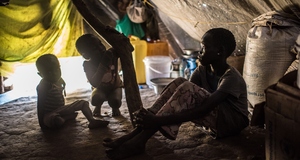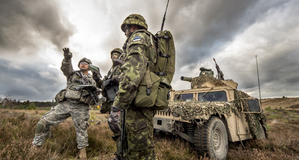The Positive Impact of African Union Forces in DarfurOne of the major world organizations experienced in dealing with civil wars and genocide is the United Nations. Bosnia, Iraq, Cyprus, and the Congo are just some of the cases where the UN has sent its peacekeepers in order to stabilize the situation and bring hostilities to an end. Peacekeeping is a unique invention of the UN itself, because nowhere in the UN Charter does it mention the peacekeeping in its mandate. Peacekeeping was invented as an interventionist force that would come to an unstable region or state and monitor the peace process or military engagement in the conflict, protecting the civilian population from the genocide or ethnic cleansing that in many instances is carried out by the oppressive government regime. According to the UN website peacekeeping, “evolved as a pragmatic solution in the early years of the Organization when it became apparent that some of the Charter provisions relating to the maintenance of international peace and security could not be implemented as envisaged” (www.un.org). However, one of the biggest caveats of the peacekeeping process is the question of the political will of the members of the Security Council, who ultimately adopt resolutions which authorize the peacekeeping missions under Charter VI or Chapter VII of the UN Charter. National interests come to play in the Security Council, and if a particular resolution would not be beneficial to the member, it can ignore the vote or veto the whole process, thus bringing it to a standstill. Even after the successful acceptance of the resolution, the peacekeeping force might not even be assembled for months, because the UN is dependent on the contributions from the member states which provide the troops as well as supplies for the missions. Thus, the UN peacekeeping mechanism is cumbersome, slow to react, and very much dependent of the political will of just of the fifteen world’s countries that happen to be on the Security Council. As the conflict in Sudan was escalating, the UN Security Council adopted just three resolutions which called for the ending of ““the climate of impunity in Darfur”, by identifying and bringing to justice those responsible for the widespread human rights abuses (Resolution 1564, www.hrw.org). The Security Council was slow to react to the violence in Darfur, due to the fact that Darfur was not “on its agenda” and because the UN had major credential problems associated with the US invasion of Iraq. The UN acknowledged that there were severe humanitarian problems in Darfur, but fell short of sending a peacekeeping mission there, due to the fear that some permanent members of the Security Council would veto the resolution, which called for military intervention. Thus, the UN was left with the option of passing watered down resolutions which were not unanimously supported by the members, “By the time the genocide claims its last victim, the UN Security Council, which has the primary mandate of maintaining international peace and security, will be suffering from resolution fatigue” (Udombana, p. 97). Additionally, there was the feeling among some of the members that there needed to be an African solution to an African problem, which showed lack of interests in that part of the world. The UN, despite having international legitimacy, failed to produce a swift response to the ongoing atrocities in Sudan, a fact which reaffirmed credibility issues were initially exposed by the Iraq debate of late 2002 and early 2003.The issue of sovereignty, central to the UN, was one limiting factors, because states were supposed to respect each other’s sovereignty and not invade each other. Setting such a precedent would be a path towards delegitimizing the UN as an impartial institution that overlooks a state’s actions. Therefore, the UN could not adopt a strong resolution calling for swift actions that might have curtailed the Sudanese government’s genocide. Even the weak resolutions that the Security Council adopted were not supported by all members, which showed the Sudanese government that the international community was uninterested in Sudan, giving Khartoum a free hand to continue its policies. Similar to the sovereignty problem, the issue of qualification of Sudan’s atrocities arose within the UN, which has been debating on whether or not to call the ongoing atrocities in Sudan a genocide, which would trigger a specific response, compared to labeling it a humanitarian crisis. “On the one hand, the condemnation of the Sudanese government’s actions would necessitate the use of the term ‘“genocide.”’ On the other, diplomats have pragmatically calculated that use of the term would jeopardize the government’s cooperation with the AU and UN operations and thus hinder their civilian protection functions, especially in light of the harsh security conditions in Darfur, which make it impossible for AU and UN troops to disarm the Janjaweed without the government’s consent and cooperation” (Piiparinen, p.73). The international community had a tough time tackling the question of genocide, although genocide is happening; the government is systematically leveling Darfur’s villages. However, in order to trigger a swift response, the term genocide needs to be used to describe the situation in Darfur. Therefore, the mediation role has been taken by the AU, whose charter states humanitarian crises would not be tolerated, and member nations would get involved to prevent them from continuing. The UN could have been a legitimate and strong intervener in the case of Sudan, showing that the international community would not tolerate genocide and ethnic cleansing; however, internal constraints and lack of political will have prevented it from doing so. As the UN was not able to provide a swift and strong response to the atrocities in Darfur, the need for an international mediator was growing to stop the ongoing violence. International organizations like the EU and NATO did not intervene in Darfur due to internal limitations on procedural issues of military involvement. Because of this, the vacuum of mediation was fulfilled by the African Union, which stepped in and attempted to mediate the conflict between Janjaweed and government forces on one side, and JEM and SLA on the other. African states like Rwanda, which went through genocides in the 1990’s, were strong advocates for military intervention which would focus on humanitarian assistance and protection of civilians, a position which was rebuffed by other African states like Nigeria, which to an extent sided with Khartoum (Williams, p.8). Initially, the AU force consisted of few hundred troops and staff, eventually growing to 7,000, which was inadequate for overseeing the peace building process in Sudan. The AU was given many goals by its leaders and the UN Security Council, one of them being the disarmament of the Janjaweed forces, which were 10,000-20,000 strong, having the support of 200,000 military troops of the government (Gompert, p.5). Thus, the AU force was not enough for the mission, considering that it should have been at least as numerous as the smallest military fraction of the conflict (Janjaweed forces) or equal to 12,000-60,000 out of the international calculation of 2-10 troops per 1,000 inhabitants in the conflict zone (Williams, p.9). The mandate of the AMIS was unclear due to the different views of the members of the African Union, as well as due to the need not to diminish the sovereignty of the Sudanese government. However, the AU’s mission was logistically and financially supported to an extent by some Western countries, which shows that the West had interest in resolving the conflict despite international apathy towards intervention. During any conflict resolution stage, one of the major components leading to the success of the mediation is the appropriateness of the mediator. In the case of Sudan, the AU was arguably a rational and appropriate mediator, because it possessed regional knowledge and had stronger interest in the conflict resolution rather than other IGO organizations. The leading role of the AU in conflict resolution was partially exacerbated by the Western notion that “African problems require African solutions”. This is a very dangerous position to take. African problems of genocide, land, and water rights, which kill thousands, are not just African problems, but are international problem, as is showcased by cases of genocide and inter-ethnic conflict within failed states. The issue of sovereignty that tied up the UN’s actions is understandable, because even though Sudan’s government cannot control its population by peaceful means, it is still in power and possesses sovereignty over actions happening within its borders. However, the UN could have been more robust in initiating other IGO and NGO’s to address the humanitarian problem in Sudan, despite being left at the mercy of the national interests of the five permanent members within the Security Council. Thus, the AU was the only regional organization left which could have taken on the burden of dealing with the Sudanese problem. Sudan is missing a single person, or “elder”, to lead the mediation process, whose involvement might have a positive impact on the peace process, as happened with Nelson Mandela in Burundi (Kew, p.1). Centralized mediation efforts are crucial to the successful negotiations because multiple parties who have multiple goals and aims, a fact that could dampen the chance of the positive outcome. The impact of the AU forces in Sudan might seem to be a straigtforward answer; However, in order to get to the root of this answer, an in-depth analysis of the mission needs to be carried out. The goal of any intervening mission is to stop the violence on the ground and make the parties talk to each other in order to resolve the conflict. In Sudan’s case there were agreements between the warring parties, which were broken even before the ink was dry, which demonstrates the difficulty of ending violence in Sudan. The AU is the only major intervener attempting to send troops, despite being outnumbered by government and rebel forces. The failure of the AMIS mission can be partially explained by low troop numbers, inadequate financing, and lack of political motivation to resolve the issue. As it was earlier shown, even members within the AU have disagreements on how to deal with the ongoing issue of genocide in Sudan. Additionally, the AMIS is constrained by the sovereignty and uncooperativeness of the Sudanese government, which is adamant against foreign intervention.Continued on Next Page » Suggested Reading from Inquiries Journal
Inquiries Journal provides undergraduate and graduate students around the world a platform for the wide dissemination of academic work over a range of core disciplines. Representing the work of students from hundreds of institutions around the globe, Inquiries Journal's large database of academic articles is completely free. Learn more | Blog | Submit Latest in International Affairs |
















